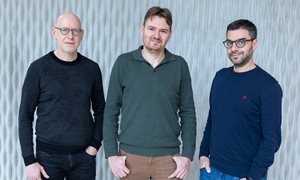
Emmanuel Mylanus has been appointed professor of Otological Implantology at Radboud university medical center / Radboud University. His research focuses on the treatment of hearing loss in children and adults. He specializes in the use of implantable hearing devices, particularly the cochlear implant.
The majority of children and adults born hard of hearing, or whose hearing declines throughout their lives benefit from a hearing aid. If such a hearing aid does not work adequately because hearing loss is too profound, patients are eligible for an implant, the best known of which is a cochlear implant (CI). This device gives adults and children with severe to profound hearing loss the ability to hear again. The CI electrically stimulates the auditory nerve and takes over the role of the dysfunctioning haircells in the cochlea. In the Netherlands, more than 500 people receive a CI each year. At the Radboudumc 135 cochlear implantations are performed yearly. Emmanuel Mylanus, affiliated at the Otorhinolaryngology Department, is one of the specialists who performs these implantations.
Cochlear implantation at a young age
Emmanuel Mylanus' research focuses on the care and treatment of hearing with implants. ‘We study the best moment to insert a CI, how much should a person still be able to hear with hearing aids before deciding for a cochlear implant?’ Also the patients’ age is important. 'We know for some time that the older a child with congenital severe hearing or deafness is, the poorer the outcome with a CI is. Operating a child at a very young age is really better.'
Therefore, at the Radboudumc, children who suffer from severe to profound hearing loss from birth receive a CI during their first year of life. 'Recent research has demonstrated that children implanted before their first birthday, when they are five, have a better level of language development than those that have been implanted at a later stage. 'The advent of the newborn hearing screening has made a big change’. 'Now we know whether a baby is deaf at a very early stage so that we can treat much earlier,' said Mylanus.
The role of the brain
Another area of focus is the brain. Mylanus: 'We measure brain activity, which helps us figure out why some groups don't do so well with a CI. It probably has to do with the plasticity of the brain.' If a person does not make use of the specific hearing region of the brain for a considerable time because of hearing loss, it becomes more difficult to activate it again with a CI. He and his team are investigating what happens to sound at the brain level. 'It is still far in the future, but perhaps one day we will be able to tune a CI to what we perceive at the brain level. If this is automated at the level of the implant there will be a closed loop.'
Societal impact
Finally, Mylanus' research is on the social impact of the CI and its significance for patients. The improvement of quality of life with cochlear implants has already been demonstrated. Our focus is on what a CI brings forth in terms of societal aspects. Do adults find jobs more easily? How are their social contacts, do people get outside more often?" are some of the questions the research team would like to see answered, in collaboration with other UMCs in The Netherlands. 'Healthcare costs are rising, and at some point we may have to make choices as a society; which care we still want to provide and which not? At that moment, we want to be ready to demonstrate the societal value of providing CI to those who need it. We see from our patients that a CI brings them a lot. We map out the social costs and benefits so that patients retain this care in the future to come.'
Career
Emmanuel Mylanus (1962, Nijmegen) studied Medicine at Radboud University, in Nijmegen. In 1994 he obtained his doctorate degree with research on the implantable device ‘bone anchored hearing aid’ (title thesis: 'The Bone Anchored Hearing Aid, clinical and audiological aspects'). This implantable hearing aid, anchored in the bone, is an option when an ordinary hearing aid cannot be fitted. He started his specialization as an ENT doctor in Nijmegen in 1994. In 1999, he joined the staff of the Otorhinolaryngology Department at the Radboudumc. From 2015 to 2021, he was a visiting professor at the University of Ghent.
Emmanuel A.M. Mylanus has been appointed professor of Otological Implantology. The appointment is effective August 1, 2022, for five years.
-
Want to know more about these subjects? Click on the buttons below for more news.
More information
Pauline Dekhuijzen

wetenschaps- en persvoorlichter






